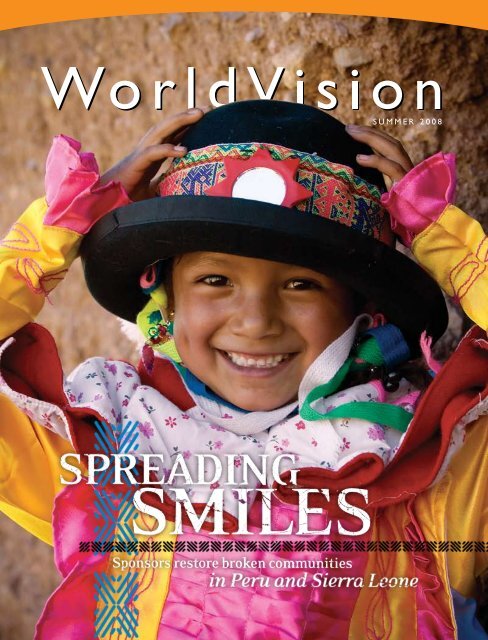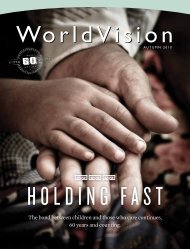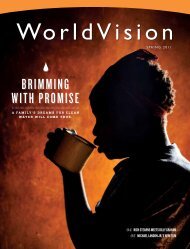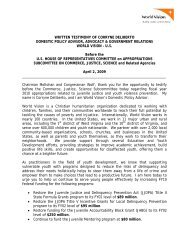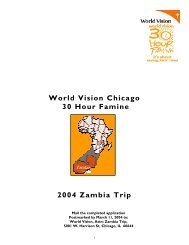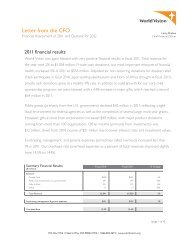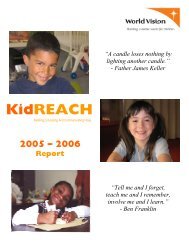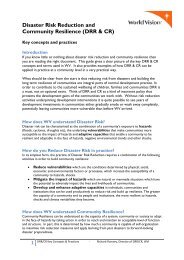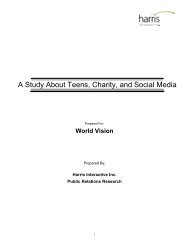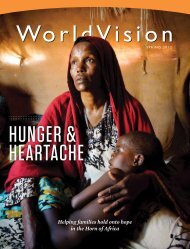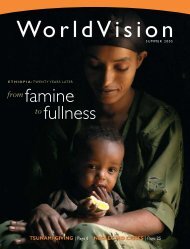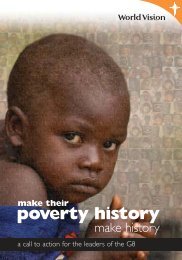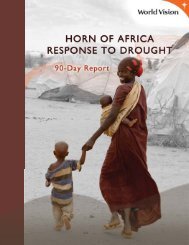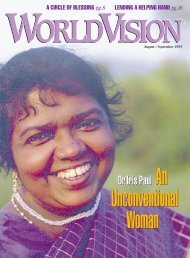Summer 2008: Inside a Sponsorship Community - World Vision
Summer 2008: Inside a Sponsorship Community - World Vision
Summer 2008: Inside a Sponsorship Community - World Vision
Create successful ePaper yourself
Turn your PDF publications into a flip-book with our unique Google optimized e-Paper software.
summer <strong>2008</strong>
gift planning<br />
let your<br />
love become<br />
a<br />
Like Mary, you can make plans that will bless children in<br />
need beyond your lifetime. Contact <strong>World</strong> <strong>Vision</strong> today<br />
to learn how easy it is to include us in your estate plan.<br />
To request a visit with a planned giving<br />
legacy<br />
“My heart goes out to people<br />
who don’t have things like a decent roof<br />
over their heads or who wonder what<br />
they will eat tomorrow . . .<br />
My hope and my prayer<br />
is that more and more people can be<br />
helped through <strong>World</strong> <strong>Vision</strong>. That’s<br />
why I [put <strong>World</strong> <strong>Vision</strong> in] my Will.”<br />
—Mary Sue, age 72, Texas<br />
officer or a complimentary copy of our<br />
Legacy Planner, please call 1.866.952.4453,<br />
e-mail giftplanning@worldvision.org, or<br />
visit www.worldvision.org/legacyplanner.<br />
<strong>World</strong><strong>Vision</strong><br />
Volume 11, Number 4<br />
President<br />
Editorial Director<br />
Editor-in-Chief<br />
Senior Editor<br />
Associate Editor<br />
Contributing<br />
Editor<br />
Photo Editor<br />
Production Manager<br />
Design<br />
& Production<br />
Richard E. Stearns<br />
Milana McLead<br />
Jane Sutton-Redner<br />
James Addis<br />
Ryan Smith<br />
Kari Costanza<br />
Jon Warren<br />
Karen Latta<br />
Journey Group, Inc.<br />
» on the cover<br />
Traditional dancing provides a creative<br />
outlet for Vanessa Rondinel Mora, 6, and<br />
other sponsored girls in Huanta, Peru.<br />
Photograph by Jon Warren.<br />
<strong>World</strong> <strong>Vision</strong>, a free quarterly publication, affirms<br />
people responding to God’s call to care for the<br />
poor by providing information, inspiration, and<br />
opportunities for action, linking them with children<br />
and families in nearly 100 countries where<br />
<strong>World</strong> <strong>Vision</strong> ministers. In an effort to be careful<br />
stewards of our resources, this publication costs<br />
less than 46 cents a copy to produce.<br />
We welcome your comments and/or address<br />
changes. Send them to: The Editor, <strong>World</strong><br />
<strong>Vision</strong> magazine, P.O. Box 9716, Federal Way,<br />
WA 98063-9716 or e-mail us: wvmagazine@<br />
worldvision.org.<br />
All scripture quotations, unless otherwise<br />
indicated, are taken from the Holy Bible, New<br />
International Version®. NIV®. Copyright<br />
©1973, 1978, 1984 by International Bible<br />
Society. Used by permission of Zondervan.<br />
All rights reserved.<br />
Charter Member, Evangelical Council for<br />
Financial Accountability; Member, Evangelical<br />
Press Association; Member, Society of National<br />
Association Publications.<br />
WORLDVISION.ORG<br />
Visit <strong>World</strong> <strong>Vision</strong>’s Web site today!<br />
At www.worldvision.org/magazine, you can read<br />
current and past issues; find special audio, video,<br />
and photo features; and e-mail articles to friends.<br />
GP08462_0208 © <strong>2008</strong> <strong>World</strong> <strong>Vision</strong>, Inc.<br />
Copyright © <strong>2008</strong><br />
by <strong>World</strong> <strong>Vision</strong> Inc.<br />
866-952-4453<br />
www.worldvision.org
12<br />
On the Cover:<br />
Digging Deep and Growing Tall »<br />
Sponsors’ support takes root in a Peruvian community.<br />
20<br />
Beyond Blood Diamond »<br />
After Sierra Leone’s war, child sponsorship helps families rebuild.<br />
4<br />
From the President<br />
Voting with our values.<br />
5<br />
FRONTLINES<br />
Global news, a musician’s big heart, and more.<br />
28<br />
Where Are They Now?<br />
Beating the odds in Bangladesh.<br />
30<br />
Inspiration<br />
A teacher’s journey from grief to joy.<br />
31<br />
retrospect<br />
Sharing a smile in Cambodia.<br />
In Peru, child<br />
sponsorship is helping<br />
disadvantaged children<br />
thrive.<br />
jon warren/world vision
FRo M the PRESIDENT<br />
Voting Our Values »<br />
All the pundits agree that the <strong>2008</strong> presidential race is a<br />
once-in-a-generation kind of election, with no incumbent<br />
president or vice president running. I listen with particular<br />
care to the debates around foreign policy because of the<br />
international nature of <strong>World</strong> <strong>Vision</strong>’s work. Just once I would<br />
like to hear the candidates discuss the importance of addressing<br />
one of the greatest terrors facing our world today: poverty that<br />
enslaves one-third of the world’s population and results in nearly<br />
10 million children under age 5 dying needlessly each year.<br />
Our founding documents proclaim that all of us are created<br />
equal in God’s sight and endowed with rights to life, liberty, and<br />
the pursuit of happiness. I don’t believe that those words should<br />
be meant only for Americans. Our good fortune in being born in<br />
this country means, to me, that God expects us to use our advantages<br />
to help those born without many. The prophet Ezekiel<br />
indicated that the sin that caused God to destroy Sodom was<br />
that they “were arrogant, overfed, and unconcerned; they did not<br />
help the poor and needy” (Ezekiel 16:49).<br />
So how should U.S. foreign policy be crafted to lift up these<br />
ideals to the rest of the world? While it is not America’s sole<br />
“We hold these truths to be self-evident, that all men are<br />
created equal, that they are endowed by their creator with<br />
certain unalienable rights, that among these are life, liberty<br />
and the pursuit of happiness.” —Declaration of Independence<br />
responsibility to save the world, our power, influence, and wealth<br />
give us a precious opportunity to lead with our values. A good<br />
place to start is with increased and strengthened foreign assistance<br />
programs that build schools, fight disease, end hunger, and<br />
bring clean water to the poorest of the poor. These programs<br />
give children an opportunity to fulfill their God-given potential<br />
and become positive leaders in their communities.<br />
In 2007 the U.S. spent five times more on the war in Iraq—<br />
one country—than we provided in foreign aid* for the rest of the<br />
world. In fact, our official development assistance on a per capita<br />
basis ranks among the lowest of wealthy nations. We spend less<br />
than 1 percent of our federal budget helping the poorest nations.<br />
As a rule, nations whose citizens have access to education,<br />
economic opportunities, and basic human freedoms are far less<br />
likely to become failed states, breeding grounds for terrorists,<br />
or enemies of the United States. What Jesus called the secondgreatest<br />
commandment—loving our neighbors as ourselves—<br />
Morgan, Rich's sponsored child.<br />
turns out to be a remarkably good basis<br />
for foreign policy. A foreign policy that<br />
consistently provides for “the least of<br />
these,” in the long run, makes for a better<br />
and safer world for our children as well.<br />
I write this as I return from Zambia,<br />
where I had the opportunity to visit<br />
one of my sponsored children, Morgan<br />
Chisanga, 16, an orphan who just six years<br />
ago was without hope and on the brink of<br />
starvation. I found Morgan sitting attentively<br />
in his classroom. He thanked me for<br />
the opportunity to go to a good school.<br />
Morgan now has dreams for his future. If<br />
you are a <strong>World</strong> <strong>Vision</strong> child sponsor, you<br />
have already cast a vote for the poor.<br />
Yes, illegal immigration, universal<br />
access to health care, and the war in Iraq<br />
are very important election issues. But<br />
before you cast your ballot this fall, find<br />
out what each of the candidates will do<br />
for the 95 percent of the world’s children<br />
who live outside the United States. ■<br />
* The U.S. foreign affairs budget for 2007<br />
was $32.5 billion. President Bush has significantly<br />
increased foreign aid. However, as a<br />
percentage of our GNP, the U.S. ranks 21st<br />
among the world's wealthiest nations.<br />
jon warren/world vision<br />
4 | <strong>World</strong> <strong>Vision</strong> <strong>Summer</strong> <strong>2008</strong><br />
www.worldvision.org
F r o n t<br />
Compiled by James Addis<br />
Tragic Tradition<br />
Zeineba Jemal, 18, was forced to undergo female circumcision, otherwise<br />
known as female genital mutilation (FGM), shortly before her marriage at<br />
age 15. An estimated 130 million girls around the world have been subjected<br />
to this harmful cultural practice; in Ethiopia, where Zeineba lives,<br />
more than 70 percent of women have endured it. FGM can cause damage<br />
to reproductive organs, childbirth complications, and even death.<br />
After fleeing her abusive husband, Zeineba has gone back to school. In<br />
Ethiopia and other African countries, <strong>World</strong> <strong>Vision</strong> is working to help girls<br />
avoid Zeineba’s fate by educating communities on the dangers of FGM<br />
and offering alternative rites of passage. To combat early marriage—often<br />
linked to FGM—<strong>World</strong> <strong>Vision</strong> advocates for girls to stay in school. ■<br />
» For more information about FGM,<br />
visit www.worldvision.org/fgm.<br />
alyssa bistonath/<strong>World</strong> <strong>Vision</strong>
Indonesia<br />
gerson molina/world vision<br />
w o rld watch<br />
Indonesia | Seaweed Sells » Hundreds of poor<br />
farmers in the remote islands in East Nusa Tenggara<br />
are enjoing a rapid rise in living standards following<br />
a boom in the seaweed trade. <strong>World</strong> <strong>Vision</strong><br />
conducted intensive training in seaweed cultivation<br />
among farmers, leading to a vast improvement in<br />
the quality of the crop. Strong demand for seaweed<br />
in the food and cosmetic industry has seen prices<br />
leap by more than 50 percent.<br />
susan cuthbert/world vision<br />
Bosnia and herzegovina<br />
United States | Uganda Lobby Day » About 800<br />
advocates converged on Capitol Hill in February to press Congress to help end the<br />
war that has turned thousands of children into soldiers and sex slaves in northern<br />
Uganda. The event, co-sponsored by <strong>World</strong> <strong>Vision</strong>, sought more U.S. diplomatic support<br />
for ongoing peace talks.<br />
6 | <strong>World</strong> <strong>Vision</strong> <strong>Summer</strong> <strong>2008</strong><br />
www.worldvision.org
F r o n t l i n e s<br />
Uganda | Ebola Breaks Out » An outbreak of the lethal Ebola virus<br />
prompted <strong>World</strong> <strong>Vision</strong> to evacuate all staff from western Uganda. More than 30 people<br />
died after contracting the virus, including one <strong>World</strong> <strong>Vision</strong> volunteer. <strong>World</strong> <strong>Vision</strong> donated<br />
drugs and protective equipment to the Ministry of Health to help counter the disease.<br />
Former Yugoslavia | leading lenders » Forbes named<br />
two <strong>World</strong> <strong>Vision</strong> microfinance institutions in the top 50 in the world. EKI, based in Bosnia<br />
and Herzegovina, was ranked 14 th , while Agroinvest, operating in Montenegro and<br />
Serbia, was ranked 22 nd . The institutions provide loans to poor families for agricultural<br />
development, small businesses, and improved housing.<br />
credit<br />
Bosnia and Herzegovina | Children Bridge Divide »<br />
Children divided by bitter ethnic strife came together to learn peace-building skills at a<br />
winter camp held at a lodge north of Sarajevo. Child representatives came from 12 schools<br />
in the Bosniak/Croat Federation and Republika Srpska mini-states as part of a <strong>World</strong> <strong>Vision</strong><br />
peace initiative. Organizers said that accompanying teachers from the hostile communities<br />
were skeptical at first, but children quickly made friends.<br />
Myanmar | Sex, Drugs, and AIDS » <strong>World</strong> <strong>Vision</strong> launched a new<br />
project to counter the rampant spread of AIDS in areas bordering China and Thailand. A<br />
flourishing sex and drug trade, plus the presence of millions of migrant workers, is fuelling<br />
the spread of the disease. <strong>World</strong> <strong>Vision</strong> will target high-risk groups with prevention messages<br />
and care for those infected.<br />
Uzbekistan | Special-Needs Support » An innovative new center<br />
for children with special needs has opened in the capital, Tashkent. The <strong>Community</strong><br />
Based Rehabilitation point, sponsored by <strong>World</strong> <strong>Vision</strong>, is unique in Uzbekistan. The center<br />
will give economic, legal, and psychological support to children and their families—<br />
helping children integrate into society and reducing their chances of ending up in<br />
grim institutions.<br />
uganda<br />
simon richard mugeny/world vision<br />
Uganda | Children<br />
Challenge Charles » Children presented<br />
a statement to Prince Charles shortly before<br />
the Commonwealth Heads of Government Meeting<br />
in Kampala, calling for a Commonwealth Children’s<br />
Forum. The forum would hold governments accountable<br />
for children’s welfare. The statement was<br />
derived from a memorandum signed by 180 children<br />
at a children’s conference, organized by <strong>World</strong><br />
<strong>Vision</strong> and similar organizations.<br />
Somalia | War on TB » <strong>World</strong><br />
<strong>Vision</strong> has secured a grant for $29 million from the<br />
Global Fund to fight tuberculosis. Money will be<br />
spent on expansion of the organization’s 47 treatment<br />
centers, drug procurement, and staff training.<br />
Somalia has one of the highest TB burdens in the<br />
world. Currently, <strong>World</strong> <strong>Vision</strong> treats about 12,500<br />
patients each year. ■<br />
John kabubu/worldvision<br />
prayerpoint<br />
Once-peaceful Kenya erupted into<br />
violent clashes following a disputed<br />
presidential election in December<br />
2007. Hundreds of people were<br />
killed and more than 300,000<br />
fled their homes. Pray for healing<br />
among ethnic factions and safety<br />
for vulnerable women and children.<br />
Please also ask God’s protection<br />
for <strong>World</strong> <strong>Vision</strong> workers as they<br />
provide relief and comfort for displaced<br />
families. ■<br />
figure it out<br />
Numbers from <strong>World</strong> <strong>Vision</strong>’s 2007<br />
Annual Review:<br />
<strong>World</strong> <strong>Vision</strong>:<br />
Helps 100 million people<br />
Operates in nearly 100 countries<br />
Employs 31,000 staff<br />
Runs 1,399 development projects<br />
Appreciates 3.1 million U.S. supporters<br />
» For the full review, visit<br />
www.worldvision.org/AR<br />
Building a better world for children<br />
<strong>World</strong> <strong>Vision</strong> <strong>Summer</strong> <strong>2008</strong> | 7
fastfact » Last year, 86<br />
percent of <strong>World</strong> <strong>Vision</strong>’s total U.S.<br />
revenue was designated for programs<br />
that benefit children, families, and<br />
communities in need.<br />
Acting on Hunger<br />
A neglected play boosts the 30 Hour<br />
Famine effort.<br />
Budding playwrights Heidi and<br />
Kari Brizendine from Bonney Lake,<br />
Wash., spent a year working on<br />
their first script, “The Mysterious<br />
Anonymous,” but then hit a snag.<br />
laura reinhardt/<strong>World</strong> <strong>Vision</strong><br />
Their family loved the sisters’ madcap<br />
mystery tale set in the 1940s, but they<br />
wondered when it would ever be staged.<br />
“We didn’t really know,” says Heidi, 21. “A<br />
year passed, and the script sat useless in a<br />
folder, without any purpose.”<br />
That changed when their church—<br />
Bonney Lake <strong>Community</strong> Church—was<br />
pondering how to help raise money for<br />
<strong>World</strong> <strong>Vision</strong>’s 30 Hour Famine. Each year,<br />
thousands of young Americans participate<br />
in the Famine and raise millions of dollars<br />
for hungry children.<br />
The congregation considered the<br />
usual suspects—car washes and bake<br />
sales—but instinctively felt the need for<br />
something more exciting. When Heidi<br />
suggested they put on the play, there was<br />
immediate enthusiasm.<br />
Come opening night, there wasn’t an<br />
empty seat in the house. Sales of tickets,<br />
popcorn, and other treats raised more<br />
than $1,000.<br />
Says Heidi: “God blessed our performance<br />
that night and helped us realize<br />
he can use any talents to help those in<br />
need—even when you don’t know where<br />
and when they will be used.” ■<br />
» Do you have an innovative way to<br />
serve the poor through <strong>World</strong> <strong>Vision</strong>?<br />
Write to the editors at<br />
wvmagazine@worldvision.org.<br />
8 | <strong>World</strong> <strong>Vision</strong> <strong>Summer</strong> <strong>2008</strong><br />
www.worldvision.org
the<br />
for<br />
F r o n t l i n e s<br />
As candidates hit the campaign trail for the <strong>2008</strong> presidential<br />
election, they will be bombarded by every special interest group.<br />
But who speaks for the poor?<br />
<strong>World</strong> <strong>Vision</strong> urges you to consider these issues as you cast your vote. No other person<br />
has the potential to help the impoverished more than the president of the United States.<br />
Clarence Tabb Jr./Genesis Photos<br />
Top 5 Humanitarian Priorities for the New President<br />
» Increase funding to fight the global AIDS pandemic<br />
» Back initiatives to eradicate malaria<br />
» Take a lead role in bringing peace to Northern Uganda, Sudan, the Middle East, and<br />
other conflict areas<br />
» Increase financial and food aid for the poor<br />
» Fulfill U.S. commitments to achieving the Millennium Development Goals ■<br />
» For more information<br />
why I love<br />
Being a Child Sponsor »<br />
I have a twin sister, my twin sister has twins of her own, and my older sister also has twins.<br />
I got to thinking, What happens when twins need a sponsor? Would one get sponsored<br />
and not the other? I knew at that moment that I wanted to sponsor twins, so I called <strong>World</strong><br />
<strong>Vision</strong>. The lady said they do get twins that need sponsoring from time to time. I asked if<br />
she would take my name and when twins came up to let me know.<br />
Three months later, my wish came true. I received a package from <strong>World</strong> <strong>Vision</strong>, and<br />
there they were. How cute they looked<br />
and how alike. I am the proud sponsor<br />
of Hellen and Helina Owusuaah from<br />
Ghana.<br />
I enjoy mailing them little toys,<br />
games, dolls, and clothes. I feel I am<br />
blessed to touch their lives. I keep their<br />
pictures on my desk at work. When<br />
people ask me who they are, I say,<br />
phyllis aman<br />
Madison Heights, Mich.<br />
visit www.seekjustice.org, www.onevote08.org,<br />
www.globalengagement.org, and www.un.org/millenniumgoals.<br />
“They are my twins.”<br />
I hope this story inspires other<br />
people to sponsor a child—maybe a<br />
child who has something in common<br />
with them. ■<br />
» Tell us your story<br />
Why do you love being a child<br />
sponsor? Write the editors at<br />
wvmagazine@worldvision.org.<br />
courtesy shirley adams<br />
Heidi Lenssen/<strong>World</strong> <strong>Vision</strong><br />
bikingforwater<br />
Shirley Adams, 65, finds it difficult to<br />
act her age. The California woman<br />
recently completed 3,828-mile,<br />
coast-to-coast bike ride across the<br />
United States, raising $30,000 for<br />
the West Africa Water Initiative—<br />
a <strong>World</strong> <strong>Vision</strong>-led effort to bring<br />
clean water to water-scarce communities<br />
in Ghana, Mali, and Niger.<br />
Shirley's stories from a past Africa<br />
trip inspired scores of people she<br />
met during her bike ride to pledge<br />
financial support. ■<br />
visitworldvision<br />
Planning to visit the Seattle area this<br />
summer? Stop in at <strong>World</strong> <strong>Vision</strong>’s<br />
Federal Way headquarters to tour our<br />
interactive Visitors Center. See compelling<br />
displays about <strong>World</strong> <strong>Vision</strong>’s<br />
history and impact in children’s lives.<br />
The center is open Monday through<br />
Friday, 9 a.m. to 4 p.m. For more information,<br />
please call (866) 952-4453. ■<br />
Building a better world for children<br />
<strong>World</strong> <strong>Vision</strong> <strong>Summer</strong> <strong>2008</strong> | 9
jim scherer<br />
Big Man, Big Heart<br />
Mike Weaver proves God is taking résumés.<br />
Christian rock band Big Daddy Weave has supported<br />
<strong>World</strong> <strong>Vision</strong> for years, but when front<br />
man Mike Weaver was asked if he would<br />
encourage audiences to consider sponsoring a child,<br />
he was terrified.<br />
Given he weighs something in excess of 300<br />
pounds, Mike was convinced that any presentation<br />
from him on behalf of children in need would attract a<br />
chorus of smart-aleck remarks from the peanut gallery.<br />
But as things turned out, he has not encountered a<br />
“The Lord really broke our hearts<br />
for these children” —Mike Weaver<br />
single negative reaction. In fact, Mike says his pitches<br />
allow him an even greater connection with his audience—many<br />
of whom come in larger sizes.<br />
“So many people say to me they had given up on<br />
their dream because they looked a certain way,” Mike<br />
says. “Then they say, ‘If God is using guys like you, man,<br />
he must be taking résumés.’ ”<br />
Speaking about <strong>World</strong> <strong>Vision</strong> became even easier<br />
after the band got to visit sponsored children in<br />
Ecuador. Seeing projects that give children access to<br />
clean water and improved nutrition made a lasting<br />
impression on the musicians.<br />
Mike says the best part was the warmth he experienced<br />
from the children, many of whom walked<br />
several miles just to meet him and the band. When<br />
he gave one child in a group a high-five, they all went<br />
wild with enthusiasm.<br />
The experience made him even more passionate<br />
about sharing what sponsorship can do. “The Lord<br />
really broke our hearts for these children,” Mike says. ■<br />
10 | <strong>World</strong> <strong>Vision</strong> <strong>Summer</strong> <strong>2008</strong><br />
www.worldvision.org
F r o n t l i n e s<br />
“It was a great experience for me<br />
to see the little kids’ faces on their<br />
picture folders and help people to<br />
sign up and sponsor these children.<br />
I had a wonderful time.”<br />
—Jo a n n a Ol s e n<br />
» For more on Artist Associates and<br />
other ways to change your world, visit<br />
www.worldvision.org/change.<br />
Name: Joanna Olsen, 15.<br />
Home: Canby, Ore.<br />
Occupation: High school student<br />
Program: Artist Associates<br />
Buzz: Joanna is a big fan of pop and hiphop<br />
music and a dedicated singer and<br />
piano player. She admits it would have<br />
been wonderful to see Casting Crowns<br />
play when they came to Portland. But she<br />
opted to remain outside the auditorium<br />
and sign up people willing to sponsor children<br />
after the band encouraged the audience<br />
to do so. Joanna says her passion to<br />
get children sponsored arose after taking<br />
a freshman history course about Africa. ■<br />
Greg Ebersole/world vision<br />
When Annet Met Sally<br />
An Indiana student meets her sponsored child.<br />
what can i do?<br />
///////////// 5 ways to share<br />
child sponsorship<br />
courtesy sally berger<br />
Anderson University student Sally<br />
Berger rates meeting her sponsored<br />
child, Annet Angelight, as<br />
one of the best days in her life.<br />
It proved difficult for the Indiana student<br />
to travel to Annet’s home community<br />
of Bundibugyo, Uganda, so <strong>World</strong> <strong>Vision</strong><br />
arranged for them to spend a day together<br />
in Uganda’s capital, Kampala.<br />
The pair hit it off immediately. They<br />
spent time frolicking on a trampoline,<br />
going out to lunch, and sharing an ice<br />
cream together—the first time Annet had<br />
ever enjoyed such a treat.<br />
Indeed, it was a day of many firsts for<br />
Annet, 5. She had never been to a big city<br />
or seen houses and buildings equipped<br />
with such luxuries such as electric lights.<br />
Like many children in AIDS-ravaged<br />
countries, Annet lives with her grandmother.<br />
Her father is dead and her mother<br />
is too sick to look after her.<br />
Sally, 22, whose home is in Greenville,<br />
Ohio, says her greatest satisfaction as a<br />
sponsor is knowing that Annet has the<br />
opportunity to go to school. “As an education<br />
major, the fact that she is in school is<br />
just huge for me,” she says.<br />
She would encourage anybody to<br />
visit their sponsored child if they have the<br />
opportunity to do so. “Any time you can put<br />
a face to the statistics about AIDS, it totally<br />
changes the way you view it,” she says.<br />
Sally became interested in AIDS after<br />
joining Acting on AIDS—a <strong>World</strong> <strong>Vision</strong>supported<br />
student movement that advocates<br />
on behalf of those impacted by the<br />
disease. Now, as coordinator for Acting<br />
on AIDS on Anderson’s campus, she has<br />
organized students to visit HIV-positive<br />
patients in their local community. ■<br />
» To sponsor a child affected by AIDS, see<br />
the envelope between pages 16 and 17.<br />
1. Global Dinners » Host a dinner<br />
party featuring a delicious meal<br />
from your sponsored child’s country.<br />
www.worldvision.org/globaldinners<br />
2. <strong>Sponsorship</strong> Display Program »<br />
Place sponsorship brochures in<br />
highly visible community locations.<br />
www.worldvision.org/display<br />
3. A Child is Waiting » Present the joys<br />
of child sponsorship to your church,<br />
small group, or Sunday school class.<br />
www.worldvision.org/achildiswaiting<br />
4. Child <strong>Sponsorship</strong> Parties » Host a<br />
lively party for a great cause.<br />
www.worldvision.org/csparty<br />
5. Child Ambassador » Apply to be a<br />
sponsorship volunteer representative<br />
in your community. www.worldvision.org/childambassador<br />
■<br />
fastfact» <strong>World</strong>wide,<br />
there are 2.8 million children<br />
sponsored through <strong>World</strong> <strong>Vision</strong>.<br />
Building a better world for children <strong>World</strong> <strong>Vision</strong> <strong>Summer</strong> <strong>2008</strong> | 11
S p o n s o r s h i p y i e l d s f r u i t f o r c h i l d r e n<br />
living in Peru’s harsh
y ryan smith | photography by jon warren<br />
highlands.<br />
In a twist on Jesus’ parable of the sower, consider<br />
how children are like seeds sown in the soil. Some are<br />
planted along the path, where they are trampled. Some<br />
are planted in rocky soil, where they spring up quickly<br />
but are withered by the bright, hot sun. Some are<br />
planted among the weeds, which grow up and choke<br />
them. Still others are planted in the good soil, where<br />
they grow tall and multiply many times over.<br />
Huanta, a city in the highlands of Peru, has hard<br />
and rocky soil, scorched by the sun and wind. Cacti are<br />
the only plants that flourish here. Huanta’s children,<br />
too, grow up in challenging surroundings. Their parents<br />
were violently uprooted from their rural villages<br />
by terrorists, and they came to the city as transplants,<br />
trying to take root in this difficult setting.<br />
But despite the circumstances, many children are<br />
growing up strong, digging roots deeper than their<br />
parents ever dreamed. With <strong>World</strong> <strong>Vision</strong> sponsors’<br />
support, they are learning in schools, their stomachs<br />
are filled, and they are speaking up for their rights.<br />
After more than a decade, child sponsorship has<br />
changed Huanta’s environment for children, allowing<br />
them to thrive. »<br />
<strong>World</strong> <strong>Vision</strong> <strong>Summer</strong> <strong>2008</strong> | 13
ABOVE: <strong>Sponsorship</strong> helped provide clean<br />
tap water for nearly every household.<br />
BELOW: Water is especially important in<br />
the arid deserts of the Andes Mountains.<br />
FACING PAGE: A 65-foot-tall statue of<br />
Christ watches over Huanta.<br />
Huanta’s Rocky Soil<br />
In the 1980s and early ’90s, Ayacucho province, where<br />
Huanta is located, was the focal point for clashes between<br />
the Shining Path terrorist group and Peruvian government<br />
forces. The fighting left almost 70,000 people dead and<br />
500,000 uprooted. The Shining Path claimed to fight for<br />
poor, rural people, but 79 percent of the victims were those<br />
they claimed to defend.<br />
“Sometimes the terrorists would come at night. We would<br />
have to hide our children in the corn plantations,” says<br />
Gladys Condor, 38. Her children, both under age 5 at the<br />
time, could not run fast enough to escape the terrorists, so<br />
their best hope was to stay hidden while the parents fled,<br />
drawing the rebels away. “I think the children knew what was<br />
happening, because they stayed very quiet,” Gladys says.<br />
The family packed what they could carry and fled to<br />
the only place they knew was safe. But living in the city<br />
had its own difficulties. “There were no jobs here, for me<br />
or my husband,” Gladys says. She and Emiliano Perez, 44,<br />
were farmers who spoke the indigenous Quechua language<br />
instead of Spanish.<br />
Thousands of families fled to Huanta during the period of<br />
unrest. When <strong>World</strong> <strong>Vision</strong> first began working there in 1994,<br />
staff focused on providing basic necessities like food, water,<br />
and sanitation for families who settled on the edges of town.<br />
When the fighting subsided, many stayed, but they needed<br />
long-term support like safe housing and access to schools.<br />
—continued on page 17<br />
14 | <strong>World</strong> <strong>Vision</strong> <strong>Summer</strong> <strong>2008</strong><br />
www.worldvision.org
16 | <strong>World</strong> <strong>Vision</strong> <strong>Summer</strong> <strong>2008</strong>
—continued from page 14<br />
In 1996, <strong>World</strong> <strong>Vision</strong> began child sponsorship in<br />
Huanta, making a commitment to help displaced families.<br />
After 12 years of support from U.S. sponsors, many basic<br />
needs have been addressed: Nearly 97 percent of families<br />
have clean water piped to their homes; malnutrition, once<br />
rampant, is now nearly nonexistent; and all children have<br />
access to primary education. Today, <strong>World</strong> <strong>Vision</strong>’s focus is<br />
to develop local leaders so that, eventually, the community<br />
can take over the work itself.<br />
Nourishing the Seedlings<br />
Ask any parent of a sponsored child about his or her life,<br />
and you get a similar response: “Before, I didn’t know,<br />
but now...” or “In the past, we knew nothing, but now I<br />
know...” Rosario Ramos, 38, is such a success story.<br />
“When I had my first son, I didn’t know anything about<br />
nutrition,” she says. “I just made some food. I didn’t think<br />
about making a balanced meal.” But shortly after her five<br />
children were sponsored, she began attending <strong>World</strong> <strong>Vision</strong><br />
nutrition workshops. “Now I know to mix foods to get a<br />
good balance,” she says.<br />
Rosario learned that proper nutrition is only part of what<br />
her children needed. “I have to feed them with love and care,”<br />
she says. “Physical contact is important, because they learn<br />
about love from their parents. When they are loved, they are<br />
more self-confident and learn to share love with others.<br />
“I also teach them to be with God,” she adds. “It is<br />
important to have that guidance in life.”<br />
For eight years, Rosario has been a <strong>World</strong> <strong>Vision</strong>-trained<br />
health promoter. Now she leads the workshops she once<br />
attended, training mothers to create meals with a balance of<br />
energy (breads and grains), protection (fruits and vegetables),<br />
and protein (meat and dairy). Then she visits them at home<br />
to make sure they are following through with the lessons.<br />
Julia Huaman Aarujo, a 17-year-old single mother, just<br />
began attending Rosario’s weekly workshops, but she is<br />
quickly catching on. “I’ve learned about what to feed my<br />
child,” she says of her 1-year-old daughter, Yaki. “Now I<br />
give my daughter cheese, milk, eggs, and fish.”<br />
Rosario congratulates these mothers in their progress, but<br />
she doesn’t take all the credit. “I thank my children’s sponsors<br />
in the name of Jesus,” she says. “They don’t know us, but<br />
they have a big heart, and they take care of us.”<br />
Growing Young Minds<br />
When displaced families first arrived in Huanta, their children<br />
weren’t readily accepted in schools. Many parents were<br />
poorly educated themselves. <strong>World</strong> <strong>Vision</strong>, with child sponsors’<br />
support, helped pave the way for the children of the<br />
displaced to access education—starting young.<br />
In one community, <strong>World</strong> <strong>Vision</strong> created an early development<br />
center for 3-year-olds. Traditionally, children of this age<br />
were carried around on their mothers' backs, keeping them<br />
out of harm’s way but hampering social interaction and development<br />
of motor skills. <strong>World</strong> <strong>Vision</strong> staff noticed that many<br />
students entering kindergarten had difficulty playing with<br />
their peers and performing basic tasks like holding a pencil, so<br />
they created the center to help young children develop.<br />
“At the beginning, mothers thought this was a waste of<br />
time,” says teacher Nancy Silvera, 25. “But when mothers<br />
learn the importance of early education, they want to bring<br />
their children here.”<br />
The scene at the center is chaotic, with 22 youngsters playing<br />
in a plastic ball pit, climbing all over a small slide, singing,<br />
and running in every possible direction. But the chaos is<br />
purposeful, Nancy says: “Everything is for a reason.”<br />
When the children play with the plastic balls, they learn<br />
to share; when they play on the slide, they learn about taking<br />
turns; and when they sing, they exercise their creativity.<br />
“When the children started, they couldn’t climb up the stairs<br />
on the slide, but now they do it with ease,” Nancy says.<br />
“They came very shy, but here they start to be more active.”<br />
After the children run off some energy, they gather around<br />
the teacher for more structured learning. On this day, the children<br />
are learning to color with crayons. Nancy draws a few<br />
lines and dots as an example, then turns the toddlers loose to<br />
try it out for themselves. At first, the children are timid, but<br />
the short, light marks soon turn into long, bold strokes.<br />
“They draw to exercise their hands, so when they go to<br />
kindergarten, they have [better] ability to write,” Nancy<br />
explains. “There is a big difference between the children who<br />
come here and those who don’t.”<br />
Fostering Faith<br />
As Christians, <strong>World</strong> <strong>Vision</strong> workers have provided a quiet<br />
witness to families robbed of hope by the Shining Path terrorists.<br />
“<strong>World</strong> <strong>Vision</strong> staff treated us with love and care,” says<br />
Gladys, who fled the violence. Why? “Because they know the<br />
word of the Lord. In the past, I didn’t know about the Bible.<br />
FACING PAGE: Elementary students examine alfalfa plants for a<br />
school project. Afterward, they return to a <strong>World</strong> <strong>Vision</strong> computer<br />
lab to document their findings. ABOVE: Nutrition workshops<br />
provide support for young mothers like Julia Huaman Aarujo.<br />
Building a better world for children<br />
<strong>World</strong> <strong>Vision</strong> <strong>Summer</strong> <strong>2008</strong> | 17
With all the things I know now, I have changed.”<br />
On a community level, churches are critical to<br />
fostering faith. <strong>World</strong> <strong>Vision</strong> partners with seven<br />
churches in Huanta, helping them serve their congregations.<br />
Alberto Huamani, pastor of Cathedral of the<br />
Faith, says that <strong>World</strong> <strong>Vision</strong> has helped him<br />
reach people of all ages. “Before <strong>World</strong> <strong>Vision</strong> was<br />
involved, we only had services for adults,” he says,<br />
“But now we have Bible classes for the children,<br />
and the children encourage their parents to come.”<br />
<strong>World</strong> <strong>Vision</strong> trains Sunday school teachers and<br />
provides Bibles and supplies. The teachers gather<br />
on Saturdays to practice their lessons, often using puppets<br />
and songs to help the children stay interested.<br />
Luana Ramos, 6, Rosario’s daughter, looks forward to<br />
Sunday school at the Evangelical Presbyterian and Reformed<br />
Church. “We play and sing,” she says. “I learn to pray and<br />
read the Bible.”<br />
Each Sunday, the children memorize a simplified version<br />
of a Bible verse. Luana’s class learns Galatians 6:2, “Help<br />
each other when you are in trouble.” As they repeat the<br />
verse, the children gain confidence until their shouts drown<br />
out the teacher’s prompting.<br />
A Better <strong>World</strong> for Children<br />
Over the years, sponsorship has placed children at the center<br />
of the community’s concern. This is transforming the way<br />
parents view their children. During the terrorist violence,<br />
many parents hoped that their children would simply survive;<br />
now they can hope for so much more.<br />
“At first, I didn’t understand sponsorship. I was so proud<br />
ABOVE LEFT: Toddlers are encouraged<br />
to be rambunctious at the early<br />
development center. ABOVE:<br />
Kindergarteners at Madre Teresa<br />
Calcutta school march to wash their<br />
hands before lunch.<br />
of my family, and I did not want any help,” says Mauro<br />
Ramos, Rosario’s husband. “But now I have changed my<br />
mind. I realized that my family could be better.”<br />
The Ramos’ oldest son, Joey, 13, has been sponsored for<br />
as long as he can remember. Today, the teen is part of the<br />
Children’s Parliament, a group of sponsored children working<br />
for change in their community. “I talk to other children about<br />
their rights and make sure that others respect them,” he says.<br />
Joey’s group addressed the mayor of Huanta on behalf of<br />
local child laborers. “We asked the mayor to provide more<br />
support for them," he says. Last summer, Joey traveled to<br />
Lima, Peru’s capital, for a gathering of young leaders.<br />
Seeing Joey’s heart for others grow and his influence multiply,<br />
Mauro can’t help but smile. “I’m proud of my son. I<br />
never dreamed he could be in this position,” he says.<br />
“Our children don’t have to be like us. Thanks to <strong>World</strong><br />
<strong>Vision</strong>, they can be better than us.” ■<br />
Yadira Pacheco, <strong>World</strong> <strong>Vision</strong>’s communications manager<br />
in Peru, contributed to this story.<br />
18 | <strong>World</strong> <strong>Vision</strong> <strong>Summer</strong> <strong>2008</strong><br />
www.worldvision.org
31,739<br />
165,818<br />
360,963<br />
india<br />
248,047<br />
Zambia<br />
Ethiopia<br />
mozambique<br />
where u.s. sponsors’<br />
children live<br />
sponsorsneeded<br />
Top four countries for children needing sponsors:<br />
4 % Middle East/Eastern Europe<br />
21 % Asia<br />
30 % Latin America<br />
45 % Africa<br />
1. Ethiopia<br />
2. Mozambique<br />
3. Zambia<br />
4. India<br />
To sponsor a child, see the envelope between pages 16 and 17.<br />
www.worldvision.org/magazine<br />
See this story online<br />
<strong>World</strong> <strong>Vision</strong>’s Huanta personnel<br />
are trying to work themselves out<br />
their jobs—by 2015.<br />
Closing a sponsorship project, however,<br />
is far from abandoning the community.<br />
When the first children were sponsored<br />
in 1996, <strong>World</strong> <strong>Vision</strong> helped local<br />
leaders form the Association of Displaced<br />
Families in the Province of Huanta<br />
(AFADIPH) to encourage community<br />
members to come together, discuss problems,<br />
and propose their own solutions.<br />
“In the past, we were quiet, because<br />
we didn’t know how to be leaders,” says<br />
Aurelio Pineda, president of AFADIPH.<br />
“Now we know our rights. We can speak<br />
openly about everything we think, not<br />
only to <strong>World</strong> <strong>Vision</strong>, but also to the local<br />
authorities.”<br />
As the association grew and the leaders<br />
became more confident, they began<br />
to take over some of the work started by<br />
<strong>World</strong> <strong>Vision</strong>, such as nutrition workshops<br />
for mothers, after-school tutoring for students,<br />
and government lobbying efforts<br />
on behalf of displaced people. “We were<br />
shy, but we are leaving that behind,” says<br />
vice president Emiliano Perez. “We are<br />
starting to be new people.”<br />
In Huanta—and every sponsorship<br />
project across globe—<strong>World</strong> <strong>Vision</strong> sponsors<br />
provide a boost to families, helping<br />
them create a healthy way of life that<br />
they can ultimately sustain themselves.<br />
PrayerPoint<br />
Maritza Flores, coordinator of the sponsorship<br />
project in Huanta, suffered a broken<br />
spine in a vehicle accident in December<br />
2007. Please pray for Maritza and her family<br />
throughout her treatment and rehabilitation.<br />
Also, pray for the safety and health<br />
of all <strong>World</strong> <strong>Vision</strong> staff worldwide.<br />
Building a better world for children<br />
<strong>World</strong> <strong>Vision</strong> <strong>Summer</strong> <strong>2008</strong> | 19
[ s ierra leone ]<br />
How child sponsors are helping<br />
rebuild a society in Sierra Leone.<br />
In the opening scenes of the<br />
film “Blood Diamond,” Solomon Vandy,<br />
brilliantly played by Djimon Hounsou,<br />
is in total panic as he attempts to gather<br />
his wife and children and flee his village.<br />
He is running from the Revolutionary<br />
United Front—one of the ugliest rebel<br />
armies in all of Africa. Solomon knows<br />
that capture by the RUF means having a<br />
hand hacked off by a machete, enslavement,<br />
or execution. »<br />
FACING PAGE: Walking to<br />
school—a new experience for<br />
Bagbo’s children. ABOVE: Manawa<br />
Rogers loves her rebuilt classroom.<br />
Building a better world for children<br />
[ by<br />
james addis | photographs by ann birch ]<br />
<strong>World</strong> <strong>Vision</strong> <strong>Summer</strong> <strong>2008</strong> | 21
The people of Bagbo chiefdom<br />
in southern Sierra Leone<br />
don’t need to see a film to<br />
understand all this. Through<br />
most of the 1990s they personally witnessed the<br />
looting and burning of their villages and the killing<br />
and maiming of their friends by RUF thugs.<br />
Those who escaped fled to towns such as Bo,<br />
ending up in crowded displaced people’s camps<br />
dependent on aid organizations like <strong>World</strong> <strong>Vision</strong>.<br />
Others lived as nomads in the bush, surviving by<br />
eating wild fruits and roots.<br />
As the war waned, people drifted back to<br />
Bagbo. Chief Kennie Gabei surveyed the remains<br />
of his village—ruined dwellings overgrown by<br />
bush. Headmaster Joe King stared at the bullet<br />
holes through the roof of American Calvary<br />
Baptist School, a former mission school now run<br />
by the government. Blackboards and desks had<br />
been smashed up and used as firewood. In the<br />
main town of Jimi, the Rev. Jeremy Saffa discovered<br />
the burned-out shell of the Methodist<br />
church. Health clinics had been similarly wrecked<br />
and raided for drugs. Those who came home<br />
faced the daunting prospect of rebuilding their<br />
entire world.<br />
“People came in the<br />
thousands. They were so<br />
happy to have the support.”<br />
j o e k i n g<br />
h e a d m a s t e r<br />
In the face of such crippling obstacles, people<br />
carried on. Joe reopened the school even though<br />
he had zero teaching resources and rain poured<br />
through the roof. Jeremy suspended plastic sheeting<br />
across the remaining walls of the church and<br />
resumed Sunday services.<br />
Any help was welcome. <strong>World</strong> <strong>Vision</strong>, which<br />
had undertaken relief work in Sierra Leone since<br />
1996, assisted farmers by distributing seeds and<br />
tools to restart agricultural production. But if<br />
At Kids Club, children<br />
enthusiastically say their prayers.<br />
Bagbo were to thrive, there<br />
would need to be more fundamental changes.<br />
Conditions for children would need to radically<br />
improve.<br />
So over months of talks with community leaders<br />
and villagers, <strong>World</strong> <strong>Vision</strong> put a proposal to<br />
the people of Bagbo, based on a strategy that has<br />
worked in hundreds of poor communities around<br />
the world. <strong>World</strong> <strong>Vision</strong> promised to find sponsors<br />
for about 2,500 of Bagbo’s children. The<br />
funding would help children secure an education,<br />
plus fund water wells, new health clinics, and new<br />
business ventures that would benefit all local children<br />
and revitalize the community as a whole.<br />
The aid would not be a one-way street.<br />
<strong>Community</strong> representatives would form a committee<br />
to set priorities and direct the programs.<br />
<strong>Community</strong> members would supply the necessary<br />
labor to build or reconstruct schools, wells, and clinics.<br />
In addition, sponsored children would be required<br />
to attend school—a big deal for families who had<br />
come to count on them working in the fields.<br />
It wasn’t always an easy sell. Mamie Gbehen<br />
was initially suspicious. She had spent the war<br />
years hiding in the bush, and three of her children<br />
had died of hunger. In her experience, outsiders—<br />
like the RUF fighters who destroyed her village—<br />
simply caused pain. But others were more open.<br />
Farmer Mohamed Boima had no hesitation in seeing<br />
his son, Aruna, sponsored. He had come to<br />
know <strong>World</strong> <strong>Vision</strong> well in the displaced camps<br />
and during his return to Bagbo. “<strong>World</strong> <strong>Vision</strong><br />
helped us greatly to start again,” he says.<br />
Influential figures were also supportive. Bagbo’s<br />
paramount chief allowed <strong>World</strong> <strong>Vision</strong> to set up<br />
an office rent-free in one of the few houses in Jimi<br />
that survived the war intact.<br />
The program officially began in May 2004<br />
with a projected timeframe of 15 years. As the<br />
benefits have begun to emerge, remaining suspicions<br />
have dissolved. Much to Joe King’s delight,<br />
one of the first projects was the rehabilitation of<br />
his school. <strong>World</strong> <strong>Vision</strong> supplied the funding and<br />
materials, while parents turned up in droves to do<br />
the physical reconstruction. “People came in the<br />
22 | <strong>World</strong> <strong>Vision</strong> <strong>Summer</strong> <strong>2008</strong><br />
www.worldvision.org
thousands. They were so happy to have the support,”<br />
King says with a smile.<br />
The school still looks primitive, but for the<br />
children who study there—both sponsored and<br />
non-sponsored—it’s a new world. Sponsored child<br />
Samuka Kanneh, 11, says the refurbished building<br />
helped him prepare for his junior high school<br />
exams. “Before, the building was dangerous. It<br />
could have collapsed at any time,” he says.<br />
Ask any child in Bagbo about why it’s good to<br />
be sponsored, and they will usually begin with<br />
their education. In addition to better school facilities,<br />
they will talk about the notebooks, pens,<br />
pencils, and school uniforms they’ve received.<br />
Their enthusiasm seems extraordinary until one<br />
remembers that the children all recall a time when<br />
these things were nonexistent.<br />
Children who have received letters, cards, or<br />
small gifts from their sponsors have something<br />
else to sing about. Most, like Kadiatu Nguguyeh,<br />
10, have never received a letter in their lives. “My<br />
sponsor wrote and said he would love to meet me<br />
one day,” she says.<br />
The letter whetted Kadiatu’s appetite to know<br />
more. “I would like to know where he lives in<br />
America and all about his family.”<br />
Meanwhile, Hawa Swarray, 9, is speechless<br />
when she receives a package from her sponsor<br />
containing stickers, toothpaste, colored pencils,<br />
and a fairy doll. For a moment she struggles to<br />
take it all in, then suddenly she reaches for the doll<br />
and clutches it to her chest, not quite believing that<br />
—continued on page 25<br />
LEFT: Bagbo’s roads pose a challenge. ABOVE: <strong>Sponsorship</strong><br />
volunteer Mary Kebbie (right) with Hawa Swarray. Mary<br />
came to trust <strong>World</strong> <strong>Vision</strong> through relief efforts after<br />
the war. She helped persuade war-weary parents that<br />
sponsorship was a good thing.<br />
Building a better world for children<br />
<strong>World</strong> <strong>Vision</strong> <strong>Summer</strong> <strong>2008</strong> | 23
Bagbo has a population of 25,000 spread over more than 70 villages,<br />
but <strong>World</strong> <strong>Vision</strong> employs only three full-time staff in the chiefdom.<br />
Volunteers perform much of the work. Here are some of them.<br />
Massa Lamin | Pump<br />
Attendant » Every village<br />
well requires someone to monitor<br />
its proper use, report breakdowns,<br />
and keep the surrounding area<br />
clean. The people of Levuma<br />
village had no hesitation in<br />
picking Massa for the role. Four of<br />
her children died due to diarrhea.<br />
Nobody knows the value of clean<br />
water better than her.<br />
“God has now blessed<br />
us with clean water<br />
in our village, so I felt<br />
responsible for taking<br />
care of it.”<br />
Patrick Rogers |<br />
Microenterprise<br />
Development Volunteer »<br />
After the war, Patrick returned<br />
home to restore his 25-acre palm<br />
oil plantation. But the successful<br />
businessman wanted yet another<br />
challenge. He decided to pass on<br />
his skills to women in <strong>World</strong> <strong>Vision</strong>’s<br />
microenterprise program. Patrick,<br />
51, bicycles up to 28 miles a day on<br />
dirt roads to reach villages.<br />
“By the grace of God, we<br />
will turn Bagbo into a major<br />
industrial center.”<br />
Sylvester Kalilu |<br />
<strong>Sponsorship</strong> Volunteer »<br />
Shocked by the level of domestic<br />
violence against children in Bagbo,<br />
Sylvester joined <strong>World</strong> <strong>Vision</strong>’s<br />
child welfare committee. Later he<br />
became a sponsorship volunteer,<br />
delivering and translating mail from<br />
sponsors to children.<br />
“I’m the one who brings all the<br />
letters to the children. It’s made<br />
me the most popular man in<br />
the community.”<br />
Julius Lahai | Child<br />
Representative, project<br />
committee » Every two months,<br />
Julius, 11, joins other community<br />
leaders to make decisions affecting<br />
the whole chiefdom. He ensures<br />
that respect for children remains a<br />
top priority.<br />
“It’s a difficult job to do,<br />
because I am the smallest<br />
person at the table. But they<br />
do allow me to talk.”<br />
24 | <strong>World</strong> <strong>Vision</strong> <strong>Summer</strong> <strong>2008</strong><br />
www.worldvision.org
—continued from page 23<br />
all this bounty could be for her. (Meet Hawa’s<br />
sponsor and other U.S. sponsors on page 27.)<br />
Another sponsored child, Sombo Fabbah, 11,<br />
explains that before sponsorship, toys were<br />
unknown. They did play ball games, but children<br />
would make the ball themselves by collecting<br />
scraps of rubbish and squeezing them tightly into<br />
a discarded plastic bag.<br />
Gifts and letters bring a much-needed splash of<br />
color into children’s lives and are important<br />
reminders of the key role sponsors are playing.<br />
And there are other contributors to children’s welfare.<br />
The program has been helped by <strong>World</strong><br />
<strong>Vision</strong> Gift Catalog money that bolsters funding<br />
from child sponsors. The catalog enables donors<br />
to give money in lump sums for big-ticket items<br />
such as water wells and health clinics.<br />
Chief Kennie Gabei says the people danced for<br />
two days when <strong>World</strong> <strong>Vision</strong> helped install a well<br />
at his village of Mandehun, ending their reliance<br />
on water drawn from a muddy swamp. “Before,<br />
about four children died from diarrhea each year,<br />
and there’s no doubt it was the fault of dirty<br />
water,” he says.<br />
Among those celebrating was sponsored child<br />
Fatmata Bao, 10, who no longer has to make<br />
several trips to the swamp after completing her<br />
3-mile walk home from school. “I used to get so<br />
tired,” she says.<br />
So far, <strong>World</strong> <strong>Vision</strong> has initiated construction<br />
of 22 wells. But there are 25,000 people in Bagbo,<br />
and <strong>World</strong> <strong>Vision</strong> program manager Edward<br />
Fewry estimates that providing clean water for all<br />
would require constructing another 50 to 60<br />
wells, something he hopes will be achieved in<br />
coming years.<br />
On the health front, things are surging ahead.<br />
Gift Catalog donations have funded the construction<br />
of three clinics, and a fourth is nearing<br />
completion. Once it’s finished, the goal of having<br />
a clinic in each of the chiefdom’s<br />
subdivisions will have<br />
been achieved.<br />
Government nurse Sando<br />
Fisher revels in the fact that she<br />
now works in a facility at Bum<br />
Kaku that is replete with a drug<br />
store, observation room, delivery<br />
room, and a freezer for vaccines. Sando laughs<br />
uproariously when she describes where she used<br />
to work—a dilapidated thatched hut with a dirt<br />
floor, devoid of equipment. On one occasion she<br />
had to beat back a poisonous snake emerging<br />
through the roof, threatening to drop on the distended<br />
tummy of a woman giving birth.<br />
For Adama Jongo, the best thing about the new<br />
clinics is that pregnant women with complications<br />
no longer have to be carried by stretcher to the<br />
main health post at Jimi, up to 12 miles away.<br />
Adama, a traditional birth attendant, was among<br />
50 midwives who attended a two-week training<br />
“Parents have renewed hope<br />
and confidence because they are<br />
seeing their children develop.”<br />
m o m o h l a h a i<br />
p r o j e c t c o m m i t t e e m e m b e r<br />
course run by <strong>World</strong> <strong>Vision</strong>. It’s early days, but<br />
Adama thinks such training has already reduced<br />
fatalities in childbirth.<br />
Statistics are more certain when it comes to<br />
malaria. <strong>World</strong> <strong>Vision</strong> ensures that each sponsored<br />
child has access to a mosquito net, complementing<br />
similar efforts by other humanitarian<br />
organizations in Bagbo. Isaac Tucker, head nurse<br />
at the Niagorehun health post, says the initiatives<br />
have slashed malaria cases by 45 percent. Malaria<br />
is the biggest killer of young children in Africa,<br />
and sponsored children like Kadiatu Nguguyeh<br />
have experienced the symptoms and know the<br />
threat. “Now my net will prevent mosquitoes<br />
from eating me,” she says.<br />
Still, one of the best indicators that poverty<br />
really is on the back burner<br />
is when people have cash in<br />
their pockets. One who has<br />
this confidence is Gbessay<br />
Loan recipient and budding<br />
entrepreneur Gbessay Bao and<br />
her children.<br />
Building a better world for children<br />
<strong>World</strong> <strong>Vision</strong> <strong>Summer</strong> <strong>2008</strong> | 25
Bao. <strong>World</strong> <strong>Vision</strong> gave<br />
women in her village three<br />
sheep to start a livestock-rearing<br />
venture. They bred them,<br />
sold some, and put proceeds<br />
into other money-making<br />
activities, such as groundnut<br />
production. <strong>World</strong> <strong>Vision</strong> also<br />
put Gbessay through a bookkeeping<br />
course—something of a challenge for a<br />
woman who never went to school. But she persevered<br />
and succeeded. Now she has about 200,000<br />
Leones ($70) in savings—a tidy sum in a country<br />
with a per capita annual income of $220.<br />
Gbessay says the best thing about having<br />
reserves is the ability to cope with sudden emergencies.<br />
“If one of my children gets sick, I have<br />
money to pay for medicines. Before, I had to rely<br />
on gathering herbs.”<br />
In late 2006, <strong>World</strong> <strong>Vision</strong> began offering more<br />
sophisticated income generation initiatives, which<br />
allow village women’s groups to borrow money for<br />
more ambitious ventures. The most impressive is in<br />
the village of Manoyogbor, where women invested<br />
a 2,704,000 Leone ($920) loan in a factory to produce<br />
garri—a food product made from cassava.<br />
Anybody familiar with the humble villages of<br />
Bagbo would be taken aback on seeing the factory<br />
in full swing. Fresh loads of cassava are ferried in<br />
from the fields on carts. It’s then grated, pressed,<br />
fermented, sieved, and baked. About a dozen villagers<br />
are engaged in production—working into<br />
the night when demand is high. Trucks cart the<br />
finished product to wholesalers in Bo.<br />
Supervisor Josephine Nabibe says the factory<br />
has been a huge morale booster, especially for<br />
parents who are now able to send their children to<br />
secondary school. “That is why we are working so<br />
hard, so that our children will not be cast aside,”<br />
she says.<br />
According to Jimi’s mayor and project committee<br />
member Momoh Lahai, the comment typifies<br />
a big change of outlook in villages. A favorite saying<br />
in Bagbo used to be, “My child is my walking<br />
stick.” In other words, children were expected to<br />
support their parents—not the other way around.<br />
Children would work long hours in the fields and<br />
carry heavy loads. School was considered not<br />
Babies are weighed at this health<br />
clinic, funded by the Gift Catalog.<br />
important, and thrashings<br />
were common. Now, Momoh<br />
says, those attitudes are declining,<br />
and chiefs are even fining<br />
parents whose children are<br />
not in school.<br />
But it’s not just the children who benefit.<br />
“Parents have renewed hope and confidence<br />
because they are seeing their children develop,”<br />
says Momoh.<br />
One way this transformation has come about is<br />
through Kids Clubs that <strong>World</strong> <strong>Vision</strong> has established<br />
at each of Bagbo’s 30 primary schools.<br />
Schoolteachers volunteer their time to run the<br />
clubs, while <strong>World</strong> <strong>Vision</strong> supplies training and<br />
resources.<br />
The club at Mattru village is a boisterous<br />
affair, involving most of the village. Adults stand<br />
at the back and about 100 children sit packed<br />
onto benches while club secretary 12-year-old<br />
Samu Lahai acts as master of ceremonies. Much<br />
of the meeting feels like a traditional Sunday<br />
school. Children repeat the Lord’s Prayer, sing,<br />
and perform sketches on Christian themes. But<br />
there’s also an emphasis on the importance of<br />
showing respect to children. One sketch features<br />
dictatorial parents treating their children like<br />
slaves. One child ends up getting a thrashing.<br />
Everybody roars with laughter as the actors ham<br />
up the beating scene. But there is a thoughtful<br />
quiet afterward when Samu points out how<br />
wrong such behavior is.<br />
Though the message can be serious, the overall<br />
tone of the meeting is joyful. Children don’t just<br />
say the prayers, they almost shout them; they don’t<br />
just get up to perform—they leap to their feet.<br />
They sing with a passion that is exhilarating.<br />
Afterward, Edward Fewry reflects on why he<br />
loves his job so much. “It’s true parents have been<br />
damaged by the war,” he says. “But you see the<br />
children—fresh, innocent, and alive. There is hope<br />
for the children.” ■<br />
Ann Birch is <strong>World</strong> <strong>Vision</strong>’s West Africa regional<br />
communications manager, based in Dakar, Senegal.<br />
26 | <strong>World</strong> <strong>Vision</strong> <strong>Summer</strong> <strong>2008</strong> www.worldvision.org
What motivates people in the United States to<br />
sponsor 2,500 children in Bagbo? Here, a few of<br />
these dedicated sponsors explain.<br />
Laura Lee Olney, husband<br />
chris, and children (Olivia, 2,<br />
Elyse, 5, Ian, 7) | Bonita<br />
Springs, Fla. | Sponsors of<br />
Hawa Swarray » Laura always had a<br />
heart for Africa and was eager that her own<br />
children learn to reach out to those in need.<br />
The family loves shopping in dollar stores and<br />
picking out items they think Hawa will love.<br />
courtesy of Laura olney<br />
“We pray for Hawa in the<br />
evenings and talk about the<br />
letters we get back from her.<br />
My children feel they have<br />
a little bit of a foothold in<br />
another part of the world.”<br />
courtesy of diane lee<br />
courtesy of jonathan slattery<br />
courtesy of soon oh<br />
Diane Lee | Orlando, Fla. |<br />
Sponsor of Fatmata Bao »<br />
Diane has sponsored children for<br />
more than 15 years and says it’s a<br />
real joy to see children progress<br />
from toddlers to adults. She hopes<br />
to go to Sierra Leone soon and<br />
meet Fatmata in person.<br />
“I’ve seen how sponsorship<br />
has helped not only the child<br />
but also their families and<br />
communities.”<br />
Jonathan Slattery, 10 | Wake<br />
Forest, N.C. | Sponsor of<br />
Samunka Kanneh » Jonathan is<br />
delighted to share a love of soccer<br />
with Samunka and was thrilled to<br />
be able to send him a soccer ball<br />
and a pump to inflate it. Jonathan<br />
does extra household chores to<br />
help pay sponsorship pledges.<br />
“I write about every two<br />
months and tell Samunka I’m<br />
thinking of him and praying<br />
for him.”<br />
Soon Oh | Huntington<br />
Beach, Calif. | Sponsor of<br />
Aruna Boima » Soon’s father died<br />
during the Korean War. Her mother<br />
brought her up during the difficult<br />
times following the conflict.<br />
“When I grew up I was poor,<br />
so I understand what it is like<br />
for kids in poverty.”<br />
www.worldvision.org/magazine<br />
See this story online<br />
Building a better world for children<br />
<strong>World</strong> <strong>Vision</strong> <strong>Summer</strong> <strong>2008</strong> | 27
WHERe are they<br />
no w?<br />
Sheuli’s sponsor helped her fulfill two<br />
dreams: to learn and to teach.<br />
Back to School»<br />
<strong>Sponsorship</strong> helped a girl overcome the odds to be<br />
educated. Now she is helping others do the same.<br />
By Ryan Smith<br />
amio ascension/world vision (2)<br />
Sheuli Som, 28, still remembers the<br />
terrifying day in 1988 that a flash<br />
flood hit her hometown of Durgapur,<br />
Bangladesh. While her parents sent Sheuli<br />
and her two older siblings away to safety,<br />
they stayed to watch over the house. “The<br />
boat left us on a highway,” Sheuli says. “We<br />
three brothers and sisters were crying and<br />
screaming, sitting on the road.”<br />
Later that night, relatives found the<br />
frightened children and helped them<br />
reunite with their parents the following<br />
day. All of the family was safe, but the<br />
flood had destroyed their home, forcing<br />
them to relocate.<br />
After the move, Sheuli’s father could<br />
not continue his job as an agricultural<br />
laborer. He was able to find some work as<br />
a tutor, but it did not pay much—especially<br />
to keep three children in school.<br />
Two years after the flood, visitors<br />
came to Sheuli’s school, wrote down the<br />
children’s names, and took their photos.<br />
Sheuli’s teacher said that the visitors were<br />
from <strong>World</strong> <strong>Vision</strong>, and they were there to<br />
sign up all the children for sponsorship.<br />
“During that time, I did not know<br />
much about <strong>World</strong> <strong>Vision</strong>,” Sheuli says.<br />
“First, I thought [it] might be a kind of an<br />
educational institute. Later I realized that<br />
my teacher did a very good job for us by<br />
enrolling us with <strong>World</strong> <strong>Vision</strong>. I have come<br />
to know that <strong>World</strong> <strong>Vision</strong> is an organization<br />
that works for development of children<br />
and community.”<br />
Shortly after being sponsored, Sheuli<br />
received a photo of her sponsor with her<br />
daughter. “She wrote me that I am like<br />
her daughter,” Sheuli says. “It touched me<br />
most—a woman who never saw me but<br />
treated me as her own daughter and supports<br />
me. I became so emotional reading<br />
her message.”<br />
28 | <strong>World</strong> <strong>Vision</strong> <strong>Summer</strong> <strong>2008</strong><br />
www.worldvision.org
“After [seeing] the photo and having<br />
her continuous support, I have realized<br />
that she is a woman of great heart,” Sheuli<br />
says. “If she is not a human being of great<br />
heart, how could she support a child from<br />
another country whom she did not meet?”<br />
As a sponsored child, Sheuli received<br />
regular medical checkups, medicine, clothing,<br />
and school supplies throughout her 16<br />
years of support. But it was the payment<br />
of school fees that was most important for<br />
Sheuli. In Bangladesh, only 48 percent of<br />
adults are literate, according to UNICEF.<br />
“If I had not been sponsored, it might<br />
[have] happened that I would [have] gotten<br />
married in young age—that traditionally<br />
happens in village life,” she explains.<br />
“My father needed to struggle very hard<br />
to keep [me] continuing my studies. There<br />
was 50-50 possibility of becoming educated<br />
without <strong>World</strong> <strong>Vision</strong>’s support.”<br />
Sheuli was an excellent student, always<br />
among the top 10 in her class. “<strong>World</strong><br />
<strong>Vision</strong> staff helped me to do well, because<br />
they were always encouraging me to continue<br />
my studies, trying to do better,” she<br />
says. Throughout her education, English<br />
was her favorite subject.<br />
Now she has found a way to put her<br />
passions into practice as an assistant<br />
teacher at Rambari Government Primary<br />
School. Sheuli teaches the English alphabet<br />
as well as the Bangla alphabet and<br />
arithmetic. She also leads physical exercise.<br />
Meanwhile, she is pursuing a master’s<br />
degree in philosophy. After completing<br />
her degree in late <strong>2008</strong>, she hopes to<br />
become a high school teacher.<br />
“I love to teach children,” Sheuli says.<br />
“I think it is an opportunity for me to give<br />
back to my community, because I am contributing<br />
toward building a literate generation<br />
and nation.”<br />
As a teacher, Sheuli witnesses the<br />
impact of sponsorship throughout the<br />
community. “I see that many poor children<br />
have gotten the chance of being educated,”<br />
she says, reflecting on how things have<br />
changed since she was young. “Poor families<br />
hardly could feed their children, and<br />
they would never think for educating their<br />
children, but through sponsorship, <strong>World</strong><br />
<strong>Vision</strong> made it possible for poor children to<br />
go to school.”<br />
Despite this improvement, Sheuli says<br />
that Bangladeshi children—especially<br />
girls—still needs sponsors. “I hope and<br />
believe that new people would come forward<br />
to support poor little children of my<br />
country, so that they could be educated<br />
like me.” ■<br />
» With reporting by Amio Ascension, a<br />
communicator for <strong>World</strong> <strong>Vision</strong> in Bangladesh.<br />
» To sponsor a child in Bangladesh or<br />
elsewhere, see the envelope between<br />
pages 16 and 17.<br />
About <strong>World</strong> <strong>Vision</strong><br />
Who We Are | <strong>World</strong> <strong>Vision</strong> is a Christian<br />
humanitarian organization dedicated<br />
to helping children, families, and their<br />
communities worldwide reach their full<br />
potential by tackling the causes of poverty<br />
and injustice.<br />
Whom We Serve | Motivated by<br />
our faith in Jesus Christ, we serve alongside<br />
the poor and oppressed—regardless<br />
of a person’s religion, race, ethnicity, or<br />
gender—as a demonstration of God’s<br />
unconditional love for all people.<br />
Why We Serve | Our passion is<br />
for the world’s poorest children whose<br />
suffering breaks the heart of God. To<br />
help secure a better future for each<br />
child, we focus on lasting, communitybased<br />
transformation. We partner with<br />
individuals and communities, empowering<br />
them to develop sustainable access to<br />
clean water, food supplies, health care,<br />
education, and economic opportunities.<br />
How We Serve | Since 1950, <strong>World</strong><br />
<strong>Vision</strong> has helped millions of children<br />
and families by providing emergency<br />
assistance to those affected by natural<br />
disasters and civil conflict, developing<br />
long-term solutions within communities<br />
to alleviate poverty and advocating for<br />
justice on behalf of the poor.<br />
You Can Help | Partnering with<br />
<strong>World</strong> <strong>Vision</strong> provides tangible ways to<br />
honor God and put faith into action. By<br />
working together, we can make a lasting<br />
difference in the lives of children and<br />
families who are struggling to overcome<br />
poverty. To find out how you can help,<br />
visit www.worldvision.org.<br />
Building a better world for children<br />
<strong>World</strong> <strong>Vision</strong> <strong>Summer</strong> <strong>2008</strong> | 29
inspiratio n<br />
Life After Death »<br />
A<br />
s an eighth-grade science teacher, I used to introduce my<br />
students to my Tanzanian sponsored child, Imani, as part<br />
of a unit focusing on the AIDS pandemic in Africa. But<br />
what my students did not know is why I chose to sponsor Imani in<br />
the first place.<br />
In 2002, I lost my beautiful, blonde, blue-eyed, nearly 3-year-old<br />
son, Aaron, when he drowned in a neighbor’s pond. After hours of<br />
intense struggle in the emergency room to save him, I whispered<br />
into his ear that he could go. I knew he was already in glory.<br />
Shortly after Aaron’s death, a group of grieving Christian moms<br />
found each other on the Internet and began to correspond. I remember<br />
asking them, “What do I do with the love that I no longer<br />
get to share with Aaron?” One mom suggested that I sponsor a<br />
child, as she had. She said it would be therapeutic. I heeded her<br />
advice and chose a child from the <strong>World</strong> <strong>Vision</strong> Web site who was<br />
born the same year as Aaron. Imani’s beautiful face popped up on<br />
my screen.<br />
Knowing that I am helping Imani helps me in the process of<br />
grieving. Aaron doesn’t need my nurturing anymore, but Imani<br />
does. In retrospect, I can see that my friend’s advice was far wiser<br />
than I could have imagined. Healing came to me when I forgot my<br />
own problems long enough to focus on someone else. There’s a<br />
“Put yourself aside, and help others.<br />
Don’t be obsessed with getting your<br />
own advantage.” —Philippians 2:4 (The Message)<br />
verse in Philippians that says, “Put yourself aside, and help others.<br />
Don’t be obsessed with getting your own advantage” (Philippians<br />
2:4, The Message).<br />
My proudest moment as a teacher came when I was somehow<br />
able to communicate this idea to my students. One year they<br />
were so inspired by Imani’s story that they wanted to raise funds<br />
for children orphaned by AIDS. I suggested that they raise money<br />
to send some of them to school. My students agreed, and we set<br />
a goal to help send four Tanzanian orphans to school for a year.<br />
I had around 140 students, of which 80 percent live at or below<br />
the poverty line and are eligible for free or subsidized lunches.<br />
Nevertheless, I asked them to bring their own money, not their<br />
parents’ money. I wanted this project to belong to them and for<br />
them to make the sacrifices. I asked them to give up a soda or<br />
Beth Richert inspires her students.<br />
candy bar, contribute part of their allowance,<br />
or do extra chores. In three weeks<br />
my students brought in $733.34—several<br />
times more than their original goal and<br />
completely from their own pockets.<br />
What thrilled me was this: I did not<br />
promise these students pizza or that I<br />
would kiss a pig if they met their goal. They<br />
did this because they felt passionate about<br />
helping. It’s not always easy to teach children<br />
to value an intrinsic reward instead of<br />
always expecting a payoff for good actions.<br />
One of my students said, “I felt passionate<br />
about helping with this project,<br />
because when I was little, I remember that<br />
meal after meal I ate bread, beans, and<br />
eggs because bread, beans, and eggs were<br />
the only things my family could afford.<br />
These children have even less.” I have had<br />
several memorable moments in my career,<br />
but this is my best one by far.<br />
There is a blessing in giving that we<br />
don’t understand until that gift returns to<br />
us in ways we never expected. That’s what<br />
I’ve learned through giving—and what my<br />
students have learned, too. ■<br />
» Beth Richert formerly taught science at<br />
Clinton Middle School, Clinton, Okla. She is<br />
now principal of Washington Elementary<br />
School in Clinton, Okla.<br />
john clanton/Genesis photos<br />
30 | <strong>World</strong> <strong>Vision</strong> <strong>Summer</strong> <strong>2008</strong><br />
www.worldvision.org
etro spect<br />
Sopheak Kong/<strong>World</strong> <strong>Vision</strong><br />
c a m b o d i a<br />
It’s all smiles for 130 children at the end of <strong>World</strong> <strong>Vision</strong>’s Children’s Leadership Workshop in<br />
Kompong Som, Cambodia. These youth participate in children’s clubs around the country, and they<br />
gathered to share their experiences and discuss their communities’ challenges. The workshop’s<br />
focus: proper nutrition. Malnutrition affects many Cambodian children; 37 percent of boys and<br />
girls under age 5 are stunted. But with the information and inspiration these young leaders now<br />
have, they can go home and spread knowledge—and smiles—in their communities. ■<br />
Building a better world for children<br />
<strong>World</strong> <strong>Vision</strong> <strong>Summer</strong> <strong>2008</strong> | 31
Published by<br />
<strong>World</strong> <strong>Vision</strong> Inc.<br />
P. O. Box 70172<br />
Tacoma, WA<br />
98481-0172<br />
If you have questions, comments,<br />
or a change of address,<br />
you may call toll-free:<br />
(866) 952-4453<br />
Nonprofit Organization<br />
U.S. Postage<br />
PAID<br />
<strong>World</strong> <strong>Vision</strong><br />
Can he<br />
escape the<br />
big disease?<br />
first it took his father. Then his mother.<br />
What 12-year-old Kombo knows as the<br />
“big disease” has stalked the villages of<br />
Kenya for years. now, having taken so<br />
much from him already, aidS threatens<br />
to steal Kombo’s life.<br />
But thanks to his sponsor, Kombo won’t<br />
have to face the future alone . . .<br />
To<br />
sponsor a<br />
child like kombo,<br />
please call<br />
1.866.952.4453<br />
Find out how Kombo is surviving with the help of a child<br />
sponsor. Visit www.worldvisionexperience.org to see<br />
if our interactive exhibit featuring Kombo’s story is coming to your area!<br />
The difference a sponsor makes:<br />
more than 1 million children in kenya—including kombo—have lost<br />
one or both parents to aIds. but thanks to his sponsor, kombo’s life<br />
is changing for the better. like every child in <strong>World</strong> <strong>Vision</strong>’s hopechild<br />
sponsorship program, kombo benefi ts from access to resources like:<br />
• Clean water, nutritious food, health care, and education<br />
• Age-appropriate HIV-prevention training based on<br />
biblical values<br />
• Trained volunteers who care for the emotional,<br />
physical, and spiritual needs of children affected<br />
by aIds<br />
NeW<br />
sponsorship<br />
welcome kit with<br />
FREE dVd!<br />
yes, I want to sponsor a hopechild today!<br />
Please send me information and the photo of a child affected by the aIds crisis.<br />
i want to sponsor a boy girl either<br />
in: africa Caribbean<br />
SourCe: 1127141<br />
I’ve enclosed a check or money order for my fi rst $35 gift (payable to <strong>World</strong> <strong>Vision</strong>).<br />
I authorize <strong>World</strong> <strong>Vision</strong> to charge my $35 monthly sponsorship gift to my credit/<br />
debit card each month*: ViSa MasterCard american express discover<br />
- - - - /<br />
Card number<br />
expiration date<br />
Signature (required)<br />
Mr. Mrs. Ms. other<br />
first name<br />
Last name<br />
<strong>World</strong> <strong>Vision</strong> account number<br />
address City State ZiP<br />
Phone<br />
e-mail<br />
<strong>World</strong> <strong>Vision</strong> will not rent, sell, or share your personal information with third parties.<br />
<strong>World</strong> <strong>Vision</strong> child sponsorship<br />
P.o. box 70050<br />
Tacoma, Wa 98481-0050<br />
1.866.952.4453<br />
* our promise to you: <strong>World</strong> <strong>Vision</strong> reviews the<br />
monthly sponsorship commitment on an ongoing basis<br />
to maintain the quality of its programs and respond to<br />
the needs of the families and communities it serves.<br />
as a participant in <strong>World</strong> <strong>Vision</strong>’s automatic giving<br />
Plan, you will receive 30 days’ advance written notice<br />
of any rate changes and will have the option to decline.<br />
SP08446_0108 © <strong>2008</strong> <strong>World</strong> <strong>Vision</strong>, inc.


